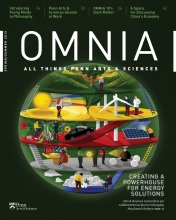Mentorship Program Provides Guidance for New Faculty
A new Penn Arts & Sciences mentoring initiative.

A new Penn Arts & Sciences mentoring initiative, called the First Two Years Program: Getting Launched, is bringing together junior and senior faculty for knowledge-sharing and networking. The program was co-developed in 2018 by former Diversity Search Advisors (DSA) Annette Lareau, Edmund J. and Louise W. Kahn Term Professor in the Social Sciences, and Greg Guild, Professor Emeritus of Biology, and current DSA Kathy Peiss, Roy F. and Jeannette P. Nichols Professor of History.
Program participants meet on a monthly basis for workshops that cover a variety of topics critical to new faculty. Each session is led by three experienced faculty members representing the humanities, natural sciences, and social sciences. Past topics have included time management, the tenure process, and networking.
“There are informal rules of the game that new faculty are expected to know, but oftentimes people don’t tell them directly. The goal of the mentoring initiative is to provide an ‘insider’s guide’ to being a faculty member, and have a cohort experience where they get to know other junior faculty,” says Lareau, who serves as Faculty Leader for the program.
“The First Two Years Program helps new faculty connect with the community of scholars outside their disciplines and departments and learn the lay of the land from experienced faculty members,” says Steven J. Fluharty, Dean and Thomas S. Gates, Jr. Professor of Psychology, Pharmacology, and Neuroscience. “Our faculty are what distinguish Penn and sustain our position among the nation’s top research universities, and this program helps them to develop strategies for successful careers as scholars and teachers.”
Assistant Professor of History Melissa Teixeira, who has attended multiple workshops, says the meetings are especially productive because they combine informal conversation over lunch with more structured presentations by senior faculty. “What makes this format so useful is that we get to think about the big picture while also having the opportunity to speak in smaller circles about our particular research and teaching practices,” she says.
Professor of English Herman Beavers, one of the workshop presenters, spoke to a group of junior faculty about getting established as faculty members. “My experience on the panel was very positive,” says Beavers. “I talked about what it means to be a mentor to undergraduate students and the necessity for us to be compassionate and sensitive to their issues. In addition, I talked about being from a first-generation, low-income background. I was extremely impressed with the group. They were each engaged in very exciting research projects and were already making wonderful contributions in the classroom.”
A full schedule of workshops is planned for next year.



